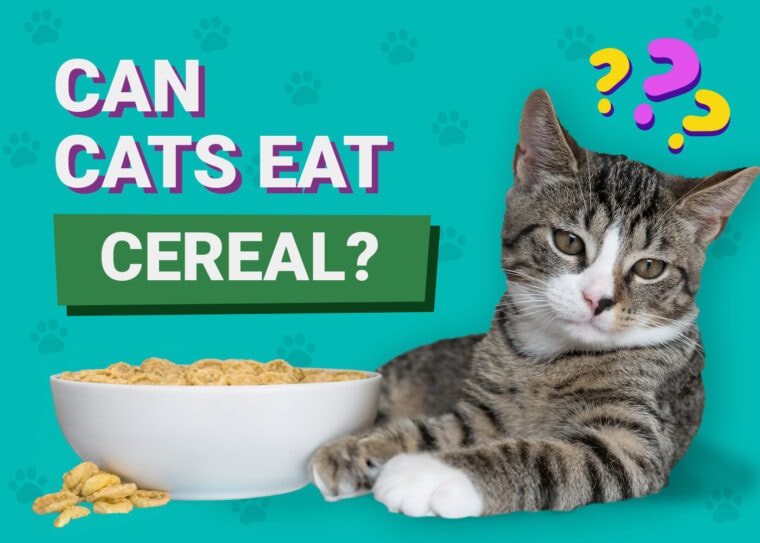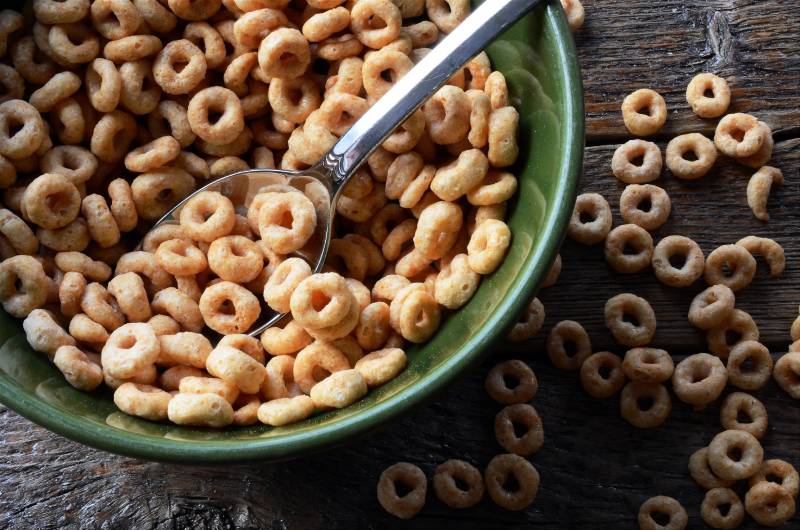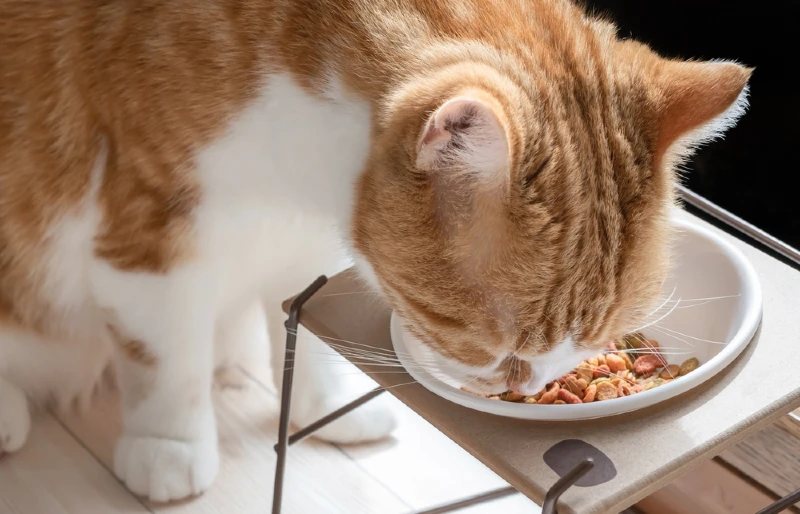
Cereal is a popular breakfast choice because of its convenience, variety, and taste. Some cereals are frosted with sugar and coated in chocolate, while others can make a fairly nutritious meal to start your day. If you are a cat parent, you may experience your cat sniffing around trying to get in on the experience, and while some breakfast cereals seem nutritious, you may wonder if they provide the same benefits for your feline friend.
While cereal is not toxic for cats, it is not the best food for them to eat. Cats are carnivores that require primarily meat in their diet and not cereal, so while a small amount of cereal from your breakfast bowl may not cause any harm, it shouldn’t be a regular part of their diet. In this article, we’ll discuss cats eating cereal in-depth to help you understand why it is better left out of your cat’s diet.
What Is in Cereal?
Before allowing your cat to eat the remnants of your cereal bowl, it’s essential to understand what makes up breakfast cereal. There are several brands available, but they are generally processed food made from grains and served with milk.
The most commonly used grains are oats, wheat, corn, rice, and barley. They often contain many other ingredients except hot cereals like plain oatmeal or shredded wheat. Most cereals are sweetened with sugar and include various ingredients, such as cinnamon, chocolate, artificial flavors, colorants, preservatives, salt, yeast, and other additives.
Some cereals contain nuts, dried fruit, marshmallows, and chocolate chips. Although some brands do not contain harmful ingredients like chocolate, it’s best to keep cereal away from cats.

Can Cats Eat Cereal?
Even though cereal can consist of so many different ingredients and can be made from a variety of grains, the answer will generally remain the same. Cats can eat a small amount of cereal, but the better question is if they should.
While cereal is not toxic to cats, there are some ingredients that can cause potential harm to your cats. Furthermore, if your cat has gluten sensitivity or grain intolerance, then the simple answer would be a strict no. A small amount of cereal will generally be ok, however, just because it is non-toxic doesn’t necessarily mean it is healthy or safe. Your cat should not be fed cereal as a replacement or addition to their meat-based diet.
Is Cereal Bad for Cats?
As we mentioned before, cereal is not toxic to cats, but that doesn’t mean it is good for them. If your cat eats a small portion, they will generally be okay, but it is unhealthy as a regular part of their diet.
Grains
Most cereals are made from a variety of grains, which is generally safe for cats. However, if your cat is gluten intolerant or grain sensitive, it should avoid cereal altogether. Grains can provide your cat with essential fatty acids, vitamins and minerals, fiber, and easily digestible protein.
Even though cats are obligate carnivores, their digestive systems are fairly effective at breaking down the carbohydrates in grains. However, that doesn’t mean that you should feed your cat cereal as part of its diet. Cats need more protein than fiber in their diets to stay healthy.

Sugar
Most cereals available today contain a lot of sugar, which is not suitable for cats. Cats do not need sugar in their diets, and too much can cause gastrointestinal upset and weight gain. High-sugar snacks can also be dangerous for cats with diabetes. In addition if it is a sugary chocolate based cereal- chocolate is toxic to cats.
Dairy
Cereals are also most often served with milk. If you didn’t know yet, most cats are lactose intolerant, which means that sharing your breakfast cereal could have some uncomfortable effects, such as an upset stomach, vomiting, and diarrhea. This may come as a surprise because a lot of cats love milk, and some owners give their cats milk, but it is another food that doesn’t need to be a part of their diet.
Ultimately, any food that doesn’t nourish your cat should be considered “bad.” Therefore, cereal can be bad for cats since it has more chance of making your cat ill than it does of providing nutritional benefits.
Can Cats Eat Dry Cereal?
We mentioned before that grains can have some minor benefits for cats and that most cats are lactose intolerant, so does that mean that cats can eat dry cereal? Again, cats can eat a small amount of dry cereal because it is not toxic, but it is generally still high in sugar, which can cause health issues if served frequently. Dry cereal may prevent your cat from vomiting due to lactose intolerance, but milk is not the only issue.
Furthermore, depending on the type of cereal, it may be hard for your cat to chew, and some cereals contain nuts or bigger nuggets of grain that may get lodged in your cat’s throat, causing them to choke.

Should Cats Eat Grains?
Grains include oats, corn, rice, barley, wheat, and rye. Then there are also grain by-products such as starch, flour, hull, bran, and gluten. In the wild, cats wouldn’t search for grains but hunt for meat since they are obligate carnivores. They don’t need grain in their diet, but their stomachs can digest more than 95% of starches.
Several commercial cat foods include grains in their ingredients as a source of easily digestible energy and vitamins. There are no noticeable negative effects on a cat’s quality or length of life when grains are added to cat food. But what about grain-free diets? Grain-free cat foods are developed for cats that may have a gluten allergy or intolerance, but grain allergies are very rare in cats.
As a result, cat food that is labeled as grain or gluten-free is not necessarily healthier or better for your cat and the nutritional value of cat food is not always determined by whether it contains gluten, grains, or grain by-products.
Knowing exactly what your feline companion can and cannot eat will help you become the best pet parent. Recognizing that not all cat bowls are equal is also key! The Hepper NomNom Cat Bowl sets itself apart from traditional options by catering to the specific needs of cats. The innovative design offers whisker relief via shallow dishes and promotes digestion with a slight bowl elevation. Find out if the Hepper NomNom is right for your cat by clicking here.
At Pet Keen, we’ve admired Hepper for many years and decided to take a controlling ownership interest so that we could benefit from the outstanding designs of this cool cat company!
What Do Cats Need in Their Diet?
Although there is no “one-size-fits-all” solution for what you should feed your cat, understanding the fundamentals of its nutritional requirements can help you choose from the available possibilities.

Protein
Cats are obligate carnivores, which means that most of the proteins in their diet come from animals. They would typically eat small rodents which are made up of mostly protein and fat. We must give our cats enough protein and fat to ensure their long-term nutritional health.
Amino Acids, Vitamins, and Minerals
Amino acids, vitamins, and minerals are all necessary for cats. High-quality cat food typically provides these nutrients in sufficient amounts.
Taurine is an essential amino acid found in protein that is uniquely important for cats and must be included in their diet as they cannot produce it themselves.
Fatty Acids
Cats also need fats and fatty acids in their diets to maintain good health. Essential fatty acids cannot be synthesized from non fat sources, such as protein or carbohydrates, and so must be provided in the diet.
Minimal Carbohydrates
The obligate carnivore diet is extremely low in carbohydrates. Carbohydrates are not necessary for the health of adult cats. Cats may, however, use carbs from their food for energy in a healthy and effective way, even though they don’t need them.
That is why cereal is not needed in a cat’s diet and why you should provide your cat with high-quality cat food made from quality protein. Your veterinarian is the best source of information when choosing a suitable brand, and they can help determine your cat’s nutritional needs, guide you with portions, and offer suggestions for picky eaters.
Conclusion
Unfortunately, cereal contains ingredients that don’t provide any nutritional benefit for your cat. They are high in sugar and often served with milk, both of which are not healthy for your feline friend. While a small portion of cereal may not cause any harm, it shouldn’t be offered to your cat as part of their diet since they rely mostly on protein-rich meals. So, it’s best to keep cereal out of your cat’s bowl and keep your cereal bowl out of your cat’s reach.
See Also:
Featured Image Credit: images72, Shutterstock









